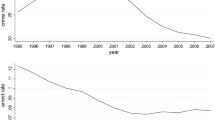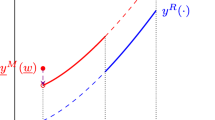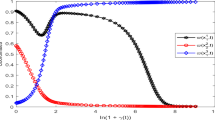Abstract
If each legislator wishes to encourage other legislators to address new problems in future periods, then a subgame perfect Nash equilibrium can exist with the following properties: (1) no legislator finds it worthwhile to make a narrow proposal that appeals to a minimum majority; (2) instead, legislators propose policies that appeal to all members, not for fear of retaliation, but rather to encourage other members to work on new problems in succeeding periods; (3) in succeeding periods no legislator amends the existing broad policy. We find an equilibrium with these properties in finite as well as infinite period games.
Similar content being viewed by others
References
Aranson, P.H. and Ordeshook, P.C. (1985). Public interest, private interest, and the democratic polity. In R. Benjamin and S. Elkin (Eds.), The democratic state, 87–178. Lawrence: University of Kansas Press.
Arrow, K. (1963). Social choice and individual values, 2nd edition. New York: Wiley.
Baron, D.P. (1989). A noncooperative theory of legislative coalitions. American Journal of Political Science 33(4): 1048–1084.
Baron, D. and Ferejohn, J. (1987). The power to propose. Research Paper No. 954. Graduate School of Business, Stanford University.
Becker, G. (1983). A theory of competition among pressure groups for political influence. Quarterly Journal of Economics 98(3): 371–400.
Cain, B., Ferejohn, J. and Fiorina, M. (1987). The personal vote. Cambridge, MA: Harvard University Press.
Cohen, L. (1979). Cyclic sets in multidimensional voting models. Journal of Economic Theory 20(1): 1–12.
Downs, A. (1957). An economic theory of democracy. New York: Harper & Row.
Friedman, J. (1986). Game theory with applications to economics. New York: Oxford University Press.
Glazer, A. and McMillan, H. (1990). Optimal coalition size when making proposals is costly. Social Choice and Welfare 7(4): 369–380.
Grofman, B. (1984). The general irrelevance of the zero sum assumption in the legislative context. In M. Holler (Ed.), Coalitions and collective action, 99–112. Würzburg, Germany: Physica-Verlag.
Harrington, J. (1990). The power of the proposal maker in a model of endogenous agenda formation. Public Choice 64(1): 1–20.
Johannes, J. (1984). To serve the people: Congress and constitutency service. Lincoln, NE: University of Nebraska Press.
Margolis, J. (1974). Public policies for private profits: Urban government. In H. Hochman (Ed.), Redistribution through public choice. New York: Columbia University Press.
McKelvey, R. (1979). General conditions for global intransitivities in formal voting models. Econometrica 47(5): 1085–1112.
Mueller, D.C. (1978). Voting by veto. Journal of Public Economics 10(1): 57–75.
Shepsle, K. and Weingast, B. (1981). Political preferences for the pork barrel: A generalization. American Journal of Political Science 25(1): 96–111.
Tullock, G. (1981). Why so much stability? Public Choice 37: 189–202.
Weingast, B. (1979). A rational choice perspective on congressional norms. American Journal of Political Science 23: 245–262.
Author information
Authors and Affiliations
Additional information
We gratefully acknowledge the comments of anonymous referees, Peter Aranson, Nick Baigent, Linda Cohen, Tyler Cowen, Bernard Grofman, Robin Keller, and Neal Stoughton. The Securities and Exchange Commission, as a matter of policy, disclaims responsibility for any private publication or statement by any of its employees. The views expressed here are those of the authors and do not necessarily reflect the views of the Commission or McMillan's colleagues on the Staff of the Commission.
Rights and permissions
About this article
Cite this article
Glazer, A., McMillan, H. Amend the old or address the new: Broad-based legislation when proposing policies is costly. Public Choice 74, 43–58 (1992). https://doi.org/10.1007/BF00175210
Received:
Accepted:
Issue Date:
DOI: https://doi.org/10.1007/BF00175210




